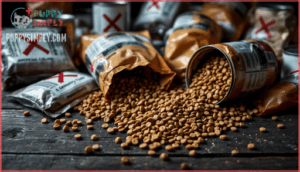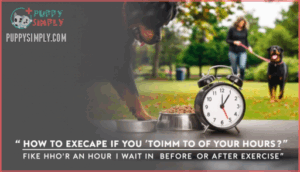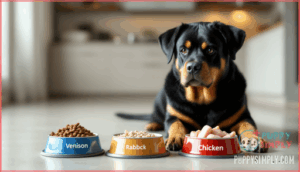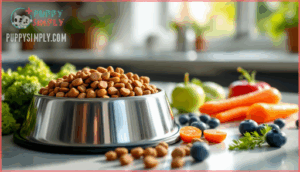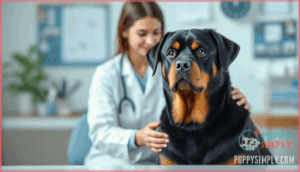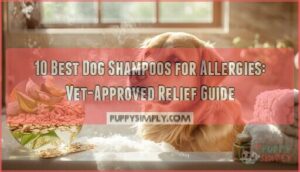This site is supported by our readers. We may earn a commission, at no cost to you, if you purchase through links.
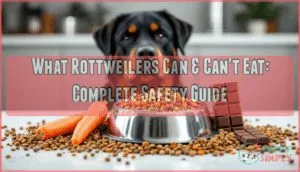
Understanding what fuels your Rottweiler versus what harms them means knowing which proteins support their muscular frame, which preservatives quietly damage organs, and how meal timing can cut bloat risk in half.
This guide breaks down the nutritional science, common allergens, and feeding strategies that keep your Rottweiler thriving.
Table Of Contents
- Key Takeaways
- Dietary Requirements for Rottweilers
- Common Allergies in Rottweilers
- Sensitive Stomach Issues
- Ingredients to Avoid
- Feeding Cautions for Bloat Prevention
- Best Diets for Rottweilers
- Foods to Avoid for Rottweilers
- Managing Food Allergies
- Choosing Hypoallergenic Dog Food
- Consulting a Veterinarian
- Frequently Asked Questions (FAQs)
- How much should I feed my adult Rottweiler per day?
- What toys and chews are safe for Rottweilers?
- How can I make my own dog treats at home?
- Should I give nutritional supplements to my Rottweiler puppy?
- What should I do if my Rottweiler stops eating?
- Can Rottweilers eat raw meat safely?
- How much water should Rottweilers drink daily?
- Are grain-free diets better for Rottweilers?
- Can Rottweilers eat commercial dog treats?
- What human foods make healthy training rewards?
- Conclusion
Key Takeaways
- Rottweilers need 22–26% protein and 15–20% fat in their diet, with active adults requiring 2,100–2,500 calories daily split into two or three meals to cut bloat risk in half.
- About 11% of Rottweilers develop allergies, with beef triggering 34% of food-allergic reactions, followed by dairy at 17% and chicken at 15%, making elimination diets lasting 8–12 weeks the gold standard for identifying triggers.
- Dangerous ingredients to avoid include artificial preservatives like BHA and BHT (found in 35% of dry foods), toxic foods like chocolate and grapes, and over 42% of pet foods contain heavy metals above safe limits.
- Strategic feeding habits prevent bloat—use slow-feed bowls to reduce eating speed by 47%, keep bowls at floor level (raised feeders double bloat risk), and wait at least one hour before or after meals for exercise.
Dietary Requirements for Rottweilers
Your Rottweiler’s nutritional needs aren’t one-size-fits-all. Adult Rottweilers thrive on dog nutrition built around 22–26% protein from whole protein sources like chicken, beef, lamb, or fish. These deliver essential amino acids that fuel muscle maintenance and energy. Fat intake should range between 15–20%, providing healthy fats for coat health and joint flexibility. Carb choices matter too—look for complex sources like sweet potatoes and brown rice rather than refined fillers.
Micronutrients including vitamins A, D, E, and minerals like calcium support bone density and immune function. Hydration needs are critical since dogs’ bodies are roughly 70% water.
Active Rottweilers generally need 2,100–2,500 calories daily, while puppies require considerably more to support growth. Rottweilers also benefit from a balanced and high-quality diet to lessen health risks. Before switching to raw or homemade diets, consult your vet to make certain your Rottweiler’s dietary requirements align with their individual health profile.
Common Allergies in Rottweilers
While balanced nutrition sets the foundation for your Rottweiler’s wellbeing, allergies can undermine even the best diet. Around 11% of Rottweilers develop dermatological disorders, including allergic conditions. Food allergies account for roughly 10–15% of all canine allergy diagnoses, though environmental factors play a larger role overall.
Watch for allergy symptoms like itchy skin, which affects over 80% of food-allergic dogs. Chronic ear infections occur in about 18% of cases, while skin infections strike approximately 60% of allergic dogs due to bacterial or yeast complications. Gastrointestinal issues—vomiting or diarrhea—appear in 10–30% of affected Rottweilers.
The biggest culprits? Beef triggers reactions in 34% of food-allergic dogs, followed by dairy (17%) and chicken (15%). Wheat, lamb, soy, and eggs round out the list. Breed predisposition means Rottweilers may face higher risk, with males showing elevated rates of pyotraumatic dermatitis. Allergen cross-reactivity between similar proteins complicates matters further, affecting up to 35% of cases. A food elimination trial is often necessary to identify the specific allergen. Diagnostic diets remain your best tool for pinpointing triggers.
Sensitive Stomach Issues
Beyond food allergies, your Rottweiler may face sensitive stomach issues stemming from digestive disorders like inflammatory bowel disease or colitis. Gastrointestinal issues account for nearly 9% of health conditions in the breed, with dietary indiscretion causing about 18% of vomiting cases.
Your dog’s deep chest structure can delay gastric emptying, increasing digestive upset risk. Protein sensitivity and disrupted microbiome stability often trigger gas, loose stools, or chronic vomiting.
Food sensitivities compound the problem, especially when high-fat diets irritate an already vulnerable gut. If your Rottweiler shows persistent gastrointestinal issues, your veterinarian can diagnose the root cause and recommend hypoallergenic diets or specialized treatments designed to restore digestive balance.
Ingredients to Avoid
When your dog’s stomach is already sensitive, the last thing you want is to add toxic additives or harmful preservatives into the mix. Many commercial dog foods contain dangerous chemicals that can worsen digestive distress or trigger serious health problems. Over 42% of analyzed pet foods contain heavy metals above safe limits, and low-cost brands often exceed permitted preservative levels by 20%.
Here’s your allergen watch list:
- Artificial preservatives like BHA and BHT appear in 35% of dry foods and raise cancer concerns
- Propylene glycol retains moisture but can damage red blood cells in high amounts
- Food dyes such as Red 40 and Yellow 5 trigger allergic responses in 2–3% of dogs
- Heavy metals like lead and aluminum contaminate animal by-products, causing neurological harm
Foods to avoid for Rottweilers include anything with these unsafe ingredients. Your careful review of labels protects your dog from harmful foods hiding in plain sight.
Feeding Cautions for Bloat Prevention
Because bloat can turn deadly within hours, your Rottweiler needs strategic feeding habits to stay safe. Meal frequency matters—splitting daily portions into two or three smaller meals cuts bloat risk in half compared to once-daily feeding.
Strategic feeding habits—splitting daily portions into smaller meals—cut bloat risk in half and can save your Rottweiler’s life
Feeding speed plays a critical role too, since rapid eaters swallow three times more air. Slow-feed bowls reduce eating rate by 47%, protecting your dog’s digestion. Bowl height shouldn’t exceed floor level—raised feeders double bloat risk in large breeds.
Water intake requires timing; remove bowls for 30–60 minutes after meals to prevent gastric expansion. Exercise timing is equally important—wait at least one hour before or after eating to avoid digestive issues.
Best Diets for Rottweilers
Finding the right diet for your Rottweiler means matching nutrition to their life stage and individual needs. Rottweiler nutritional needs shift dramatically from puppyhood through their senior years, so what works now may need adjusting later.
A quality puppy diet requires 22–26% protein and carefully balanced calcium-phosphorus ratios between 1.2:1 and 1.4:1 to support growing bones without triggering hip dysplasia. Your puppy needs 366–702 calories daily during those critical first weeks, distributed across 4–6 small meals.
Adult diet requirements plateau around 18–22% protein with 12–19% healthy fats, usually served in two meals totaling 2,100 calories for active dogs. Breed-specific formulas like Royal Canin Rottweiler Adult contain L-carnitine for lean muscle maintenance.
Senior diet adjustments reduce calories while boosting glucosamine and chondroitin for aging joints. Some Rottweilers thrive on raw feeding protocols, though you’ll need veterinary guidance before attempting homemade meals. The best diets for Rottweilers balance Rottweiler dietary requirements with individual sensitivities—watch for itching, gas, or loose stools signaling safe and unsafe foods for dogs.
Foods to Avoid for Rottweilers
Regarding toxic foods, the danger list is longer than you might think—and some items look harmless. Toxic fruits like grapes and raisins can trigger kidney failure at doses as low as 11.6 g/kg, while avocados contain persin that causes fatal fluid buildup around key organs. Harmful nuts such as macadamia nuts produce tremors and weakness at just 2.4 g/kg. Chocolate tops the list of foods dangerous for Rottweilers, with darker varieties containing enough theobromine to cause seizures and cardiac issues.
Salty foods pose equally serious risks, with sodium exceeding 2 g/kg causing tremors and seizures—cured meats and chips often hide onion powder that damages red blood cells. Raw foods carry Salmonella and E. coli, triggering gastrointestinal distress within hours.
Preventing dog poisoning means recognizing food hazards beyond the obvious: xylitol gums accounted for 17% of pet poisoning cases in 2024, while caffeine toxicity appears at doses over 20 mg/kg.
Skip these toxic substances for dogs entirely—your Rottweiler’s safety depends on it.
Managing Food Allergies
Between 10% and 20% of allergic skin disease in dogs stems from food allergies—and your Rottweiler might be one of them. Managing food allergies starts with an elimination diet lasting 8–12 weeks, where you’ll feed a single novel protein source like venison, duck, or rabbit that your dog hasn’t eaten before. About 80% of dogs show allergy symptom relief within five weeks on this strict diet trial.
| Allergy Management Strategy | Diet Trial Length | Expected Results |
|---|---|---|
| Novel protein sources (venison, rabbit, ostrich) | 8–12 weeks | Symptoms resolve in 5–8 weeks |
| Hydrolyzed protein diets (prescription) | 6–10 weeks | Rapid relief, broken-down proteins avoid immune response |
| Raw elimination diets | 8–12 weeks | Most profound improvements, requires vet supervision |
| Single ingredient reintroduction | 3–7 days per food | Symptoms return quickly if allergen identified |
| Omega-3 enriched hypoallergenic formulas | 8+ weeks | 50% reduction in itching and skin lesions |
Keep detailed food and symptom logs—gastrointestinal issues like vomiting occur in 60% of cases, while skin reactions affect 70–80% of allergic dogs. Work closely with your vet throughout this process.
Choosing Hypoallergenic Dog Food
When your Rottweiler struggles with food allergies, switching to hypoallergenic dog food can make all the difference. These specialized formulas are designed to minimize allergic reactions while still providing complete nutrition.
Here’s what you need to know about selecting the right hypoallergenic option for your dog.
Sensitive Ingredients Avoidance
When 34% of canine food allergies stem from beef and 15% from chicken, choosing hypoallergenic food means steering clear of these common culprits. You’ll want limited ingredient formulas featuring novel proteins like venison, duck, or fish to sidestep cross-reactivity issues.
Grain alternatives such as barley or potato work better than wheat or corn for sensitive stomachs. Watch for additive sensitivity too—artificial preservatives trigger skin reactions in many dogs.
Carefully reviewing labels helps you avoid ingredients that spark digestive issues or food allergies in dogs, keeping your Rottweiler comfortable and healthy.
Symptom Diagnosis and Management
Think of spotting food allergies in dogs like solving a puzzle—you need the right pieces to see the full picture. Your veterinarian will guide you through a strict elimination diet lasting 6–12 weeks, which achieves over 80% diagnostic accuracy when done correctly. This gold-standard method helps pinpoint exactly what’s triggering your Rottweiler’s allergy symptoms.
Key steps in managing digestive issues and food allergies in dogs include:
- Track symptoms carefully: Itching affects 80% of allergic dogs, while chronic ear infections appear in over 40%
- Maintain strict dietary compliance: Even small treats can increase false results by 20%
- Monitor improvement timeline: Most dogs need four weeks minimum to show relief from sensitive stomachs
Relapse prevention depends on consistency—reintroducing the old diet confirms the allergy in 90% of cases. Your veterinarian’s role extends beyond diagnosis, using dermatologic scoring systems to track inflammation improvements and keeping dietary intervention on course through regular follow-ups.
Veterinarian Prescribed Diets
Your veterinarian can prescribe therapeutic diets formulated under strict nutritional standards to target your Rottweiler’s specific health issues. These prescription dog foods undergo rigorous diet regulation and AAFCO testing to confirm balanced nutrition. Brands like Hill’s, Purina Pro Plan Veterinary Diets, and Royal Canin dominate this market, which grew 11.4% from 2023 to 2025.
Prescription benefits for your Rottweiler include:
- Hydrolyzed proteins that reduce immune reactions in allergic dogs
- Controlled-calorie recipes (3.5–3.8 kcal/g) supporting healthy weight and joint function
- Enhanced glucosamine and chondroitin levels protecting against hip dysplasia
Veterinarians recommend these diets only after diagnostic use confirms conditions through testing. About 60% of dogs revert back to regular food once their condition stabilizes under careful monitoring.
Consulting a Veterinarian
Working with a veterinarian is one of the smartest moves you can make for your Rottweiler’s health. These professionals treat nutritional assessment as an essential sign, just like checking your dog’s temperature or pulse.
They’ll conduct a thorough dietary assessment to understand your Rottweiler’s current eating habits and body condition. Through allergy testing and health check-ups, your vet can pinpoint exactly what’s triggering those uncomfortable symptoms.
They’ll create specific nutrition plans adapted to your dog’s breed-specific needs, because Rottweilers have unique requirements for joint support and controlled growth. Your veterinarian can also provide supplement guidance if your dog needs extra support, and help with weight management strategies to keep your Rottweiler at a healthy size.
Regular consultations mean you’re not guessing about canine health issues. Studies show that owners who work closely with their vet maintain better pet health outcomes and catch problems early, before they become serious.
Frequently Asked Questions (FAQs)
How much should I feed my adult Rottweiler per day?
Picture a balanced scale: too much food tips your Rottweiler toward obesity, too little leaves them running on empty. Your adult Rottweiler needs 2,100-2,500 calories daily, split into two meals. This prevents bloat and maintains their ideal body weight.
If weight shifts or stomach issues appear, consult your vet immediately.
What toys and chews are safe for Rottweilers?
Choose durable toys made for large, powerful chewers—like Kong or West Paw—to guarantee pet safety. Avoid hard bones or small pieces that pose choking hazards. Always supervise playtime and replace worn items promptly to prevent accidents.
How can I make my own dog treats at home?
Making homemade dog treats is straightforward and safe. Start with simple, dog-friendly ingredients like pumpkin, peanut butter (xylitol-free), or bananas. Mix with whole wheat flour, bake at 300°F until firm, and store in airtight containers.
These healthy dog treats offer cost savings and let you control portions while avoiding harmful additives.
Should I give nutritional supplements to my Rottweiler puppy?
Your Rottweiler puppy probably doesn’t need nutritional supplements if you’re feeding high-quality large breed puppy food. These formulas already contain balanced nutrition for healthy bone, joint, and immune system strength during growth.
However, consult your veterinarian about supplement needs—they’ll assess your puppy’s specific requirements.
What should I do if my Rottweiler stops eating?
If your Rottweiler stops eating, contact your veterinarian right away.
Appetite loss can signal underlying conditions like anemia or food aversion. Monitor hydration and other symptoms.
Your veterinarian will diagnose the issue and recommend proper treatment for your dog’s health.
Can Rottweilers eat raw meat safely?
Is feeding raw meat to your Rottweiler worth the risk? Raw diet benefits include natural dog nutrition, but bacterial contamination risks like salmonella and parasite prevention measures are critical concerns.
Bone ingestion safety and nutritional completeness concerns require careful planning. Consult your veterinarian before switching to raw meat.
How much water should Rottweilers drink daily?
Your Rottweiler needs roughly one ounce of water per pound of body weight daily. Activity levels, environmental factors, and health conditions affect hydration needs.
Watch for dehydration signs like dry gums or lethargy, which can impact digestive health and kidney function. Consult your veterinarian if water intake changes noticeably.
Are grain-free diets better for Rottweilers?
Not necessarily. Grain-free dog food won’t help most Rottweilers unless they’ve confirmed food allergies to specific grains. While some dogs benefit, many Rottweilers digest grains just fine.
Before switching, talk to your vet about whether grain alternatives make sense for your dog’s specific needs.
Can Rottweilers eat commercial dog treats?
Yes, your Rottweiler can enjoy commercial dog treats when you choose safe brands with quality ingredients. Check labels for potential allergens, practice portion control, and consider homemade treats for better dog food safety and overall dog health.
What human foods make healthy training rewards?
Small pieces of cooked chicken, carrots, or blueberries work well as healthy training treats. These safe foods offer dog nutrition without excessive calories, but portion control matters.
Keep reward frequency high and sizes tiny to avoid overfeeding while managing any potential food allergies.
Conclusion
Think of feeding your Rottweiler like programming a telegraph—one wrong input creates system-wide problems. The definitive guide to what Rottweilers can and can’t eat isn’t about memorizing lists. It’s about recognizing how your dog’s body reacts to different foods.
Watch for scratching, loose stools, or ear infections after meals. These signals tell you what’s working and what isn’t. Your Rottweiler depends on you to decode those messages and adjust accordingly. Their long-term health starts with what you put in their bowl today.
- https://www.petcarerx.com/article/rottweiler-diet-and-allergies/492
- https://dogstandards.ca/blogs/what-the-dog/best-diet-for-rottweilers
- https://www.petmd.com/dog/breeds/rottweiler
- https://www.petscare.com/news/post/rottweiler-feeding-chart-guide
- https://www.dogster.com/dog-nutrition/what-do-rottweilers-eat



